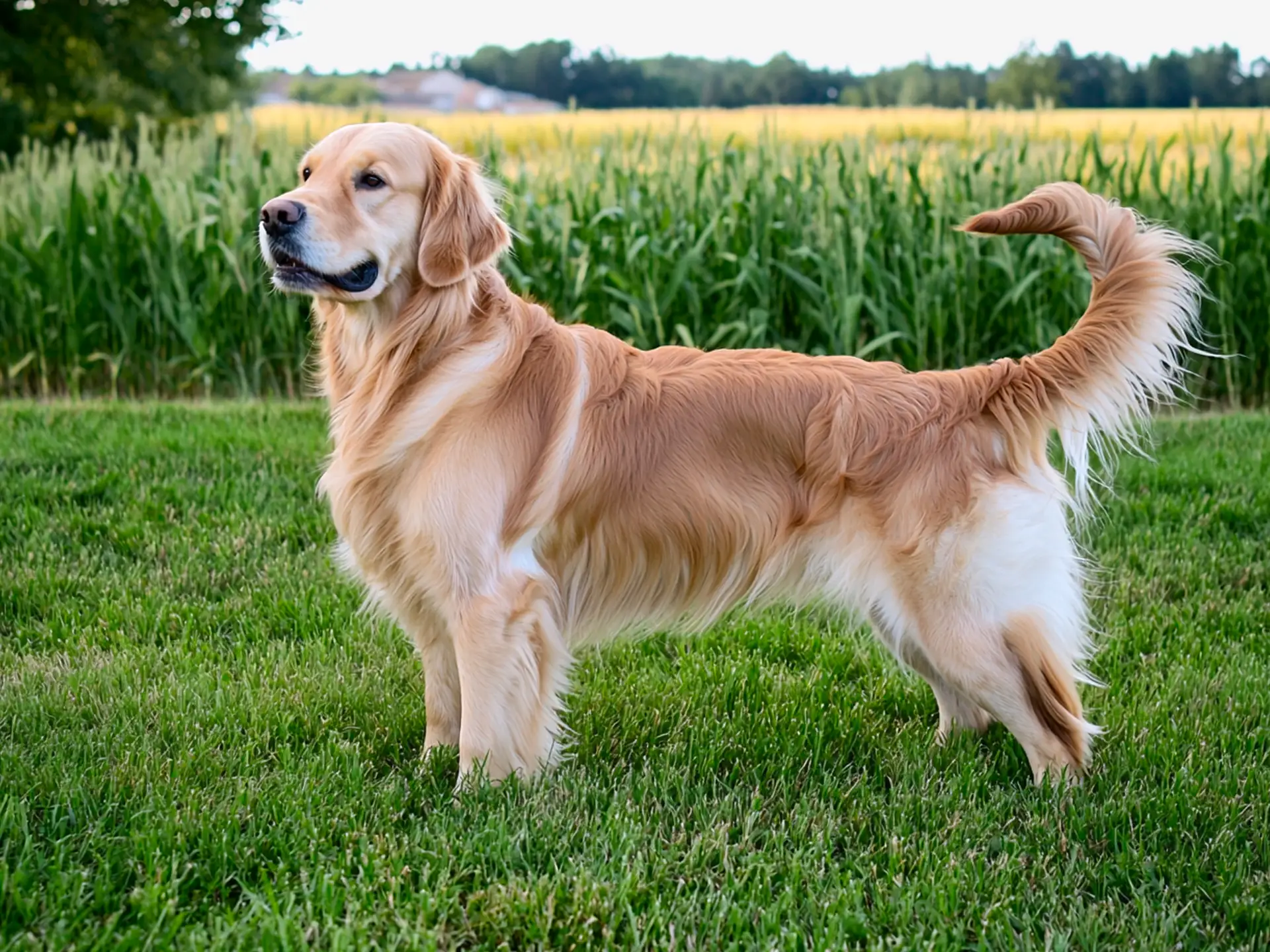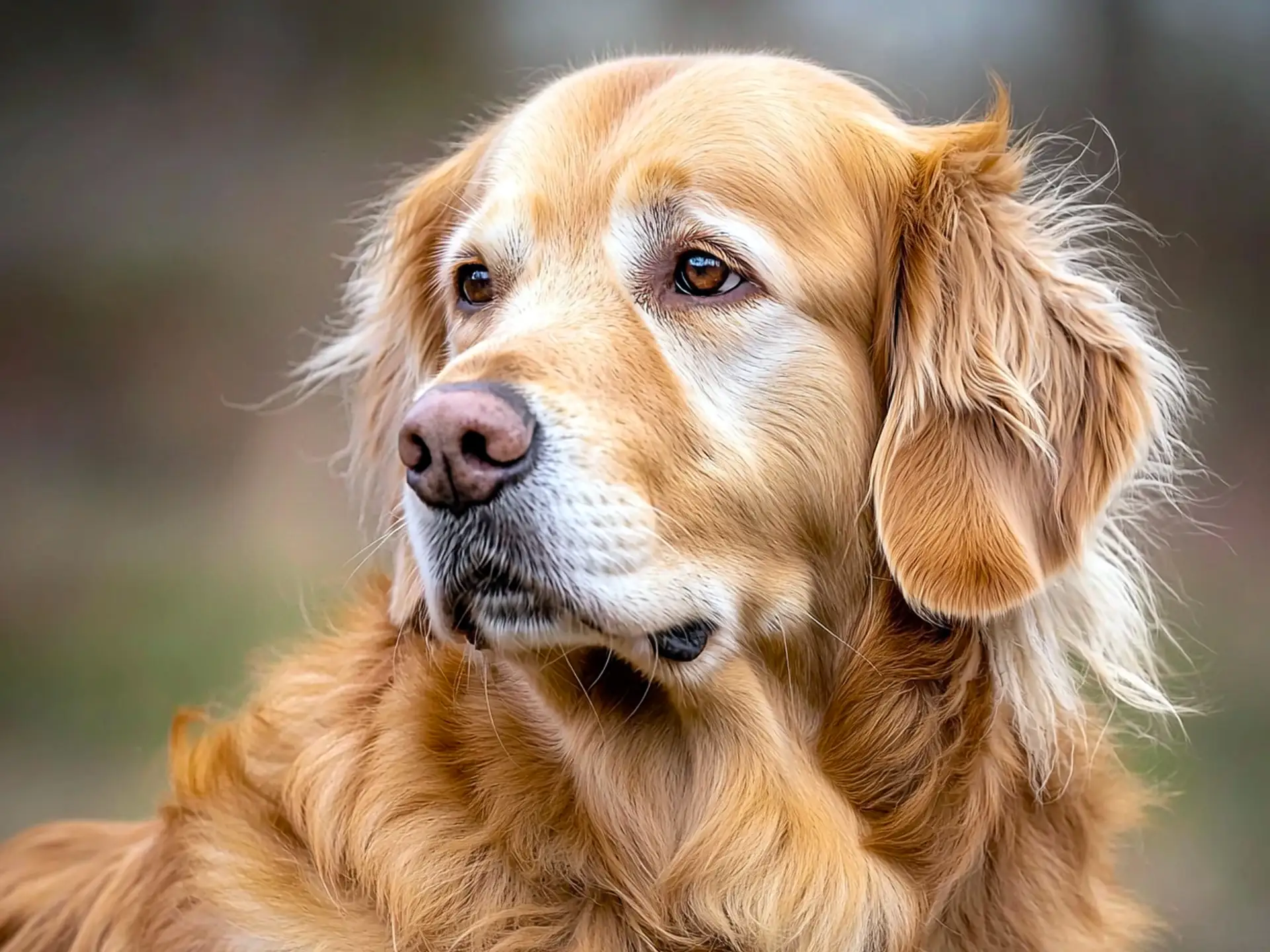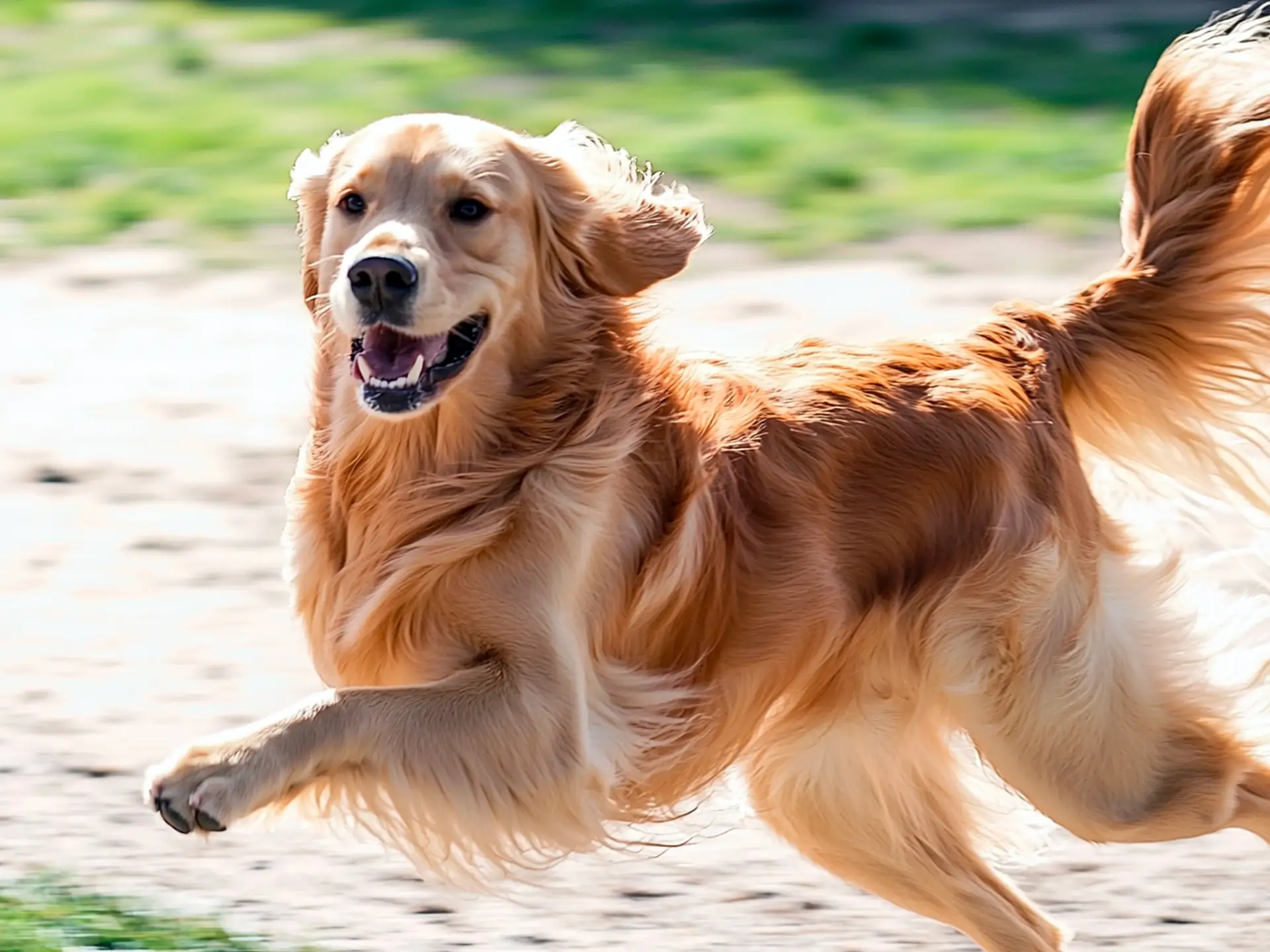Golden Retriever Dog Breed Info & Overview
The Golden Retriever is the epitome of loyalty, friendliness, and intelligence. Renowned for their affectionate nature, these energetic dogs thrive in family settings, forming strong bonds with kids and other pets. Whether you’re seeking an active adventure buddy or a gentle playmate for your children, the Golden Retriever’s adaptable and loving personality makes them an ideal companion for any household.
Characteristics
Pictures
Breed History
Did you know the Golden Retriever’s journey began in the lush highlands of Scotland? In the mid-19th century, Lord Tweedmouth had a vision of creating the ultimate hunting companion. By crossing a Yellow Retriever with the now-extinct Tweed Water Spaniel, he achieved just that—a dog with a gentle mouth, perfect for retrieving game on both land and water.
Golden Retrievers quickly gained recognition for their intelligence and adaptability. By 1911, the Kennel Club in the UK officially recognized them, and their popularity soared. They weren’t just expert hunting dogs; they also excelled in obedience and became beloved companions.
Fast forward to today, and Golden Retrievers are one of the most adored breeds worldwide. From guiding the visually impaired to starring in rescue missions, their versatility and charm have cemented their place in homes and hearts across the globe.
Temperament, Personality
Golden Retrievers are the definition of “man’s best friend.” They’re known for their unshakeable loyalty and sunny disposition, always ready with a wagging tail and warm nuzzle. Their eagerness to please makes them a joy to train and a delight to have around.
With children, they’re gentle giants—patient, playful, and protective. Golden Retrievers thrive on human connection and fit seamlessly into family life, often becoming the kids’ best playmates. They also tend to get along well with other pets, even the family cat, as long as introductions are smooth.
Their warm demeanor extends to strangers too. While they may alert you with a friendly bark, their welcoming nature makes them poor guard dogs. They’re more likely to wag at an intruder than ward them off! Their loving, people-centric personality ensures they’re always the heart of the household.
Physical Characteristics
Golden Retrievers are as striking as they are lovable. Their luxurious double coat—thick, water-repellent, and soft to the touch—is their most iconic feature, shimmering in shades of gold from light cream to deep amber. Their coat isn’t just for looks; it’s designed for working in rugged terrain and water.
Their athletic build is perfectly balanced, with males standing 23–24 inches tall and weighing 65–75 pounds, while females are slightly smaller at 21.5–22.5 inches and 55–65 pounds. Their strong, broad heads, soft brown eyes, and gentle expressions are instantly recognizable.
One of their most endearing traits is their feathery tail, carried with an infectious cheerfulness. Combine that with their smooth gait and powerful build, and you have a dog that’s as elegant in motion as they are playful at heart.
Health Issues
Golden Retrievers are sturdy dogs, but like all breeds, they have their vulnerabilities. Hip and elbow dysplasia are common, leading to discomfort and mobility issues over time. Regular vet visits and keeping them at a healthy weight can help manage these concerns.
Cancer, particularly hemangiosarcoma and lymphoma, is unfortunately prevalent in this breed. Routine health screenings and a watchful eye for unusual symptoms can make all the difference. Golden Retrievers may also face heart issues like subvalvular aortic stenosis, so cardiac evaluations are wise.
Eye conditions such as cataracts and progressive retinal atrophy may develop, especially as they age. Working with a reputable breeder who performs health clearances is essential for minimizing risks. Regular check-ups ensure your furry friend stays happy and healthy.
Grooming Needs
Golden Retrievers are undeniably glamorous, but that fabulous coat comes with responsibilities. Brushing them at least twice a week keeps tangles at bay and reduces shedding. During shedding seasons in spring and fall, daily brushing is your best bet to manage the golden fur tsunami.
Baths every 4–6 weeks keep their coat clean and shiny, but be careful not to overdo it—excessive bathing can strip their coat’s natural oils. Use a high-quality, dog-friendly shampoo to maintain their signature glow.
Pay attention to their ears, as their floppy nature can trap moisture and lead to infections. Regular teeth brushing and monthly nail trims are also crucial. With the right routine, your Golden Retriever will always look and feel their best.
Exercise Requirements
Golden Retrievers are active and love to move! They thrive on at least 1–2 hours of exercise daily, whether it’s a romp in the park, a swim in the lake, or a spirited game of fetch. Their boundless energy makes them ideal companions for active families or individuals.
These dogs excel in activities like agility, obedience training, and even dock diving. If you enjoy hiking, they’ll happily tag along, tail wagging and ready for adventure. Mental stimulation is just as important—puzzle toys and interactive games can keep their sharp minds engaged.
Without enough exercise, Golden Retrievers may resort to chewing or other mischief. A tired Golden is a happy Golden, so keep them active and involved in family fun.
Training Tips
Training a Golden Retriever is a rewarding experience. They’re intelligent and eager to please, making them quick learners. Positive reinforcement is your best tool—treats, praise, and playtime will motivate them to ace commands and tricks.
Start socialization and obedience training early. Exposure to different people, pets, and environments helps them develop confidence and prevents unwanted behaviors. Consistency is key, and short, engaging sessions are more effective than lengthy drills.
Golden Retrievers excel in advanced training and can even be taught complex tasks. Whether you’re working on basic commands or preparing them for therapy work, their trainability and enthusiasm make them a star student.
Nutrition, Diet
Golden Retrievers are food lovers, but their diet needs to be carefully managed. On average, they require 2–3 cups of high-quality kibble daily, divided into two meals. Look for foods rich in omega-3 fatty acids to support their coat and joint health.
Because they’re prone to obesity, measure portions precisely and limit high-calorie treats. Consider foods formulated for large breeds, as these include the right balance of nutrients for their size and activity level.
Always consult your veterinarian to tailor a diet that suits your dog’s specific needs. Fresh water should be readily available, and table scraps—especially harmful ones like chocolate or onions—should be avoided at all costs.
Adoption, Breeders
If you’re ready to welcome a Golden Retriever, start with a reputable breeder or rescue organization. The Golden Retriever Club of America provides breeder referrals, ensuring health clearances and ethical practices. Always meet the puppy’s parents to gauge temperament and health.
Adopting is another great option! Organizations like Grin Rescue specialize in rehoming these lovable dogs. They often have adult dogs ready to fit into your family with ease.
Avoid pet stores or unreliable breeders where health and temperament may be compromised. Taking the time to find the right source will set the foundation for a happy, healthy life together.
Family Pet?
Golden Retrievers are the quintessential family dog. Their gentle nature and boundless affection make them fantastic companions for kids of all ages. They’re patient, playful, and protective, forming lifelong bonds with their families.
They get along well with other pets, especially if introduced early. Golden Retrievers love being part of the action, whether it’s a family game night or a lazy Sunday morning. They adapt well to various family dynamics and are happiest when surrounded by love.
Their size and energy mean they thrive in homes with space to roam. While apartment living is possible with adequate exercise, a yard or nearby park is ideal for their active lifestyle.
Right For You?
Golden Retrievers bring joy wherever they go, but they require commitment. If you lead an active life and enjoy spending time outdoors, they’ll be the perfect partner for your adventures. Their love for people and intelligence make them versatile companions.
However, they do need time, attention, and grooming. If you’re frequently away or have limited energy to meet their exercise needs, another breed might be a better fit. Golden Retrievers are social dogs who thrive on companionship.
If you’re ready to invest in their care, a Golden Retriever will reward you with endless loyalty, love, and golden memories.
Conclusion
Golden Retrievers are more than just dogs; they’re family. From their rich history as skilled hunters to their modern roles as loyal companions, they embody love, intelligence, and versatility. If you’re ready for an active, affectionate partner, the Golden Retriever will fill your life with joy and laughter.
FAQs
-
Why do Golden Retrievers carry items in their mouths?
Golden Retrievers were bred as hunting dogs to retrieve game without damaging it, so they have a natural instinct to carry objects gently. This “soft mouth” trait often leads them to carry toys, shoes, or even random household items.
-
Can Golden Retrievers be trained for emotional support work?
Yes, Golden Retrievers are one of the most popular breeds for emotional support due to their calm demeanor, empathy, and trainability. Their natural ability to bond deeply with humans makes them ideal for providing comfort and companionship.
-
Why do Golden Retrievers often lean against their owners?
Leaning is a common behavior in Golden Retrievers, showing their affection and trust. It’s their way of seeking attention or feeling secure. This endearing trait highlights their desire to be close to their human companions.
-
Do Golden Retrievers change coat color as they grow?
Yes, Golden Retrievers’ coats often darken slightly as they mature. Puppies may start with a light or cream-colored coat, which develops richer golden tones as they age.
-
Why do Golden Retrievers love water so much?
Golden Retrievers were originally bred for retrieving waterfowl, so they have a natural affinity for swimming. Their dense, water-repellent coat and webbed feet make them excellent swimmers who thrive in water-based activities.
Breed Ratings
Golden Retrievers are highly intelligent and excel in obedience and advanced training tasks.
Their playful nature makes them great companions for children and adults who enjoy active play.
High energy levels require daily exercise and mental stimulation to keep them content.
They shed moderately year-round and heavily during shedding seasons; regular grooming helps manage it.
While bred for retrieval, they have a moderate prey drive and usually get along with other animals.
Their dense coat requires regular brushing, especially during shedding periods.
Their eagerness to please and intelligence make them highly trainable.
Golden Retrievers prefer company and may develop anxiety if left alone too long.
Moderate barkers; they may bark to alert but are generally not noisy.
Minimal drooling compared to other large breeds.
They are sociable with other dogs and enjoy canine company.
Prone to certain health issues; regular vet care is essential.















